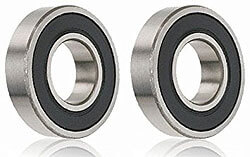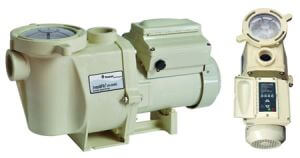FREE Standard Shipping On All Orders $100 or More!*
Noisy Pool Pump Solutions
Swimming pool pumps that are noisy can keep you from enjoying peaceful naps by the pool, or can keep your neighbors up at night. When the pool equipment is loud, it's always the pool pump. Filters, heaters and chlorinators are fairly quiet, as they don't have motors.
Let's talk swimming pool pump noise abatement...
Pool Pump Noise Causes:
1. Cavitation Noise
In this case, the pump is too large for the pipe size and/or number of pipes bringing water into the pump, and effectively is 'starved for water', or is receiving less than its desired water intake. Cavitation produces low, gravely sounds, which can be very loud. A clogged impeller or skimmer line, broken or very full pump basket, or closed suction valves, can also produce pump cavitation noise. Another reason not to oversize the pool pump - don't replace a medium flow pump with a high flow pump (installing a Super II to replace a Superpump, for example), or a Northstar, just because it has a huge pump basket. To test if you have pump cavitation, disconnect the motor from the pump, and turn on the power briefly to listen to the motor.
2. Vibration Noise
Pool pumps are meant to be bolted down to the concrete pad. This protects the pump from movement and theft (yes, some areas have problems with pool equipment theft), but stops vibration noise or chattering on the concrete. To test if vibration is causing your pool pump noise, press down on the motor (it will be hot!) and pump, to see if the sound changes. Loud pool or spa pumps installed on wood decks will always be noisy. Wood decks can act like a drum, resonating the vibration and motor noise. See below for ways to secure your pump to the equipment pad to reduce vibration noise.
3. Worn Bearings

There are two shaft bearings, a front bearing and a rear bearing, which help the rotor turn smooth and true, inside of the stator. Over time, the lubricants inside of the sealed bearing will grow thin, or small changes in the ball bearings themselves, will cause the bearing(s) to make noise. Replacement of the motor bearings and shaft seal, known as a motor rebuild, is the cure for loud pump motors. You could also replace the entire motor, or even the entire pump, although the wet end pump parts are likely not damaged, and could last for many more years.To test if motor bearings are the problem, pull the motor out of the pump, and turn on power briefly to listen to the motor.
Pool Pump Noise Solutions:
1. Deflect the Sound
Building a small wall in between the pump and the pool is a good method to deal with a loud pool pump, unless you deflect the pump sound right into a neighbor's bedroom window! Like water, sound can be channeled and directed to specific areas. Build 3 walls to direct sound in one direction only, and add a hinged roof for best results. Plants or bushes can also help to diffuse pump sounds, but rarely make a large difference, a solid wall or low fence is best for deflecting sound. Concrete or stucco walls are better than wood or steel, as they resonate much less.
2. Dampen the Sound
As mentioned above, bolting your pump to the concrete pad is the usual way to prevent pump vibration noise. For concrete pads, drill holes with a masonry/concrete bit, and insert concrete lags or anchor bolts - not as hard as it sounds, although the pump may need to be moved first. Aboveground pumps and spa pumps with the 48Y pedestal base are generally bolted down to the plastic base, and can rattle loudly if not secured. You can also slip a square of rubber, or a carpet remnant under a pump base, to dampen vibration or shim the pump base, if not sitting perfectly level. Another way to dampen pool pump noise is to put a box around it - and that's exactly what the folks at noisypool.com are selling, an insulated box that fits over your pump, for about $300.
3. Reduce the Sound
If the sound is cavitation, where the pump is not getting enough water, the choice is either add another incoming line, increase the pipe diameter for suction lines (both hard to do), or replace the pump motor and impeller with a smaller size, or replace the entire pump with one that matches your circulation system.
If a loud pool pump sound is the motor bearings squealing and screeching, the choice is to rebuild the motor, replace the motor (and shaft seal) or replace the pump.

If you really want a quiet pool pump, the ultimate pool pump noise solution is to install a variable speed pump. With TEFC permanent magnet motors, they run quiet and cool to the touch. VS pool pumps like the Hayward Superpump VS, Pentair IntelliFlo (shown) and Jandy ePump are whisper quiet and an easy replacement for existing single speed pumps. VS pumps not only solve a pool pump noise problem, they can save 70% on your pool pump electrical costs.
Restore your peaceful backyard, and make your neighbors happy. There are many ways to deal with a noisy pool pump, you don't have to put up with it any longer.